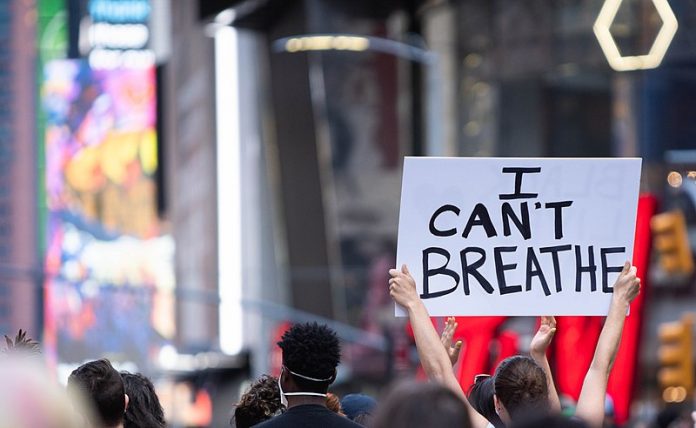The United States’ claim of being the champion of human rights has been shattered by the ongoing violence in the country. The violence attests to the fact that racism continues to haunt the American society, raising question marks over its democratic institutions.
The death of George Floyd, an African-American citizen, at the hands of a policeman on May 25 required an immediate suspension of the official and a probe into Floyd’s brutal murder. That would possibly had calmed and comforted American people who thronged the streets to protest against the heinous crime. What is encouraging is that so many white Americans, Europeans and Australians have supported the demonstrations, underscoring their anti-racist and anti-white supremacy views.
Notably, the demonstrations against Floyd’s killing are underway in hundreds of cities in the U.S.; the demonstrators are carrying placards which say: ‘Black lives matter,’ ‘No justice, no peace’ and ‘I can’t breathe’. ‘I can’t breathe’ reportedly were the last words of Floyd when the policeman was kneeling on his neck – the incident was watched and filmed by dozens of people for about nine minutes before he died. Four policemen had taken Floyd into custody allegedly for a twenty-dollar counterfeit note which he had taken to a grocery shop for buying cigarettes; even if this incident is true, there is no justification for the police to kill a man or beat him mercilessly.
Floyd’s killing has proven a turning point, triggering widespread violent protests with people looting and setting fire to shops in America; outrage is there around the world. The killing has been viewed as a gruesome instance of racism perpetrated against the black community in the U.S. Demonstrations have been reported from Australia, Canada, Germany, France, Britain, Spain, Belgium, Brazil, Hungary and many other countries with the demonstrators calling for an end to racism against the black people. It is hard to answer if these ‘out-of-America’ agitations are a sign of enlightment or simply a bandwagon. Nevertheless, it is a healthy trend.
Meanwhile, racism is not confined to the U.S. or to the countries where white people are in majority. Not a long ago, in Rwanda and Bosnia-Herzegovina, thousands of people were killed purely on the basis of racism. Nearly 200,000 Bosnian Muslims were killed and about 50,000 women were raped during the ethnic cleansing from 1992 to 1995 by Serbian forces when the Bosnia-Herzegovina decided to leave Yugoslavia ruled mainly by Serbs. Around 800,000 Rwandans were killed from April to June 1994 mostly by the Hutus, the majority tribe in Rwanda.
Still fresh are the tragic memories of Apartheid, the systematic discrimination by whites against blacks in South Africa; the anti-black policies were abolished through a long campaign spearheaded by Nelson Mandela.
Most recently, Myanmar witnessed racism to a considerable degree. This time the target population was the ethnic Rohingya Muslim community. Thousands of Rohingyas were killed, women raped and thousands of them turned refugees.
Coming back to the rising incidents of what is seen as racism in the United States, the brief lull in violence for a week was broken on Sunday (June 14) when another black man, the twenty-seven year old Rayshard Brooks was killed on Friday (June 12) although in police shooting this time. This prompted the National Association of Colored People (NAACP), urging people to join the campaign against racism, to say, “We do not have the full right to live in this country. Business as usual may cost us our livelihood and our lives.” These words from the NAACP act as a grim reminder of the words from the lips of the civil rights leader Martin Luther King Jr. when he said why black people protest in America: “A riot is the language of the unheard,” the king had said more than half a century ago. Tragically, nothing seems to have changed since then. Thousands of people in the past few weeks have taken to the streets against racism and discrimination in the U.S.
This begs a few questions: what shall the ongoing agitation earn for the black community in the U.S.? Will it swing the pendulum in their favor? Will it bring them on par with the whites? Agreed that the demonstrations have brought world attention towards the police brutality in America, but most black people will continue to be deprived of their share in America’s riches and will keep on earning less than the white people; many will not have better schools for their children; many will not have access to better healthcare and to better jobs. All of this discrimination simply because they are not white in skin color.
Although as per the American constitution, all American citizens, black as well as white — are equal before the law, in practice U.S. police stop people on the way on the basis of appearance and even go to the extent of harming them. That is what George Floyd’s case illustrates: he was unarmed and no threat to the U.S. security. Yet, he was killled.
Even during the term of first black U.S. president, Barack Obama, there were incidents of killings against the black people. While in office, Obama watched the killing of Michael Brown, an 18 year-old black man by a policeman — there were widespread protests. Another black man named Eric Garner was killed by a policeman; Eric’s dying words were ‘I can’t breathe’, the same words were on the lips of George Floyd when a policeman choked him to death.
The case of Floyd is not an isolated one; there have been many a case like that of him and carried out in cold blood. Prejudice against blacks is shown not only by the police and judges but also by teachers and employers. The protests underway are directed towards the whole malady of racism.
The views and opinions in the article are those of the author.

Sheikh Shabir Kulgami is a Kashmiri (Indian) political commentator, analyst and columnist. He writes extensively on South Asia.


